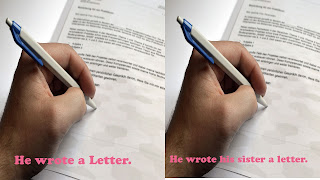All Sentences have a
subject and a verb. Some sentences may also have an object after the main verb.
An object is a part of the predicate in a sentence. It receives the action done
by the subject.
There are two types of objects with a sentence; as direct
and the indirect object.
1- The Direct Object
A direct object is a noun/noun phrase or pronoun that receives the action of a verb directly. A direct object answers the questions; as,
- What?
- Who?
- Whom?
A sentence that has a direct object may or may not have an indirect object.
Example:-
- He wrote a letter. (not have )
- He wrote his sister a letter (have)
"his Sister" is an indirect Object here and "a letter" is direct Object.
2- The Indirect Object
An indirect object is the noun/noun phrase or pronoun to whom for whom the action is done. it receives the action through the direct object and not directly. indirect object answers the questions;
- at whom
- to whom
- for whom
- form whom
it often comes after a preposition. There can be no indirect object without a direct object.
Examples:-
- He wrote to his sister a letter. (Indirect object )
- He wrote a letter to his sister. (Noun Phrase)
3- Examples of Direct and Indirect Object
- Simon Feeds his pet rabbit carrots.
- Mother is bringing us some food.
- The postman handed Kathy the Letter.
- Mandy lent Linda her music book.
- Bobby offered Helen her bicycle.
- Jimmy is passing Linda The salt.
- The mother fed her child milk.
- David gave Melanie a sweater.
- Let me read you this news item.
- Vicky paid the cashier the money.
- We showed David photos.
- They found me a spare ticket.
- I have saved you a seat.
- Melanie is making David a cake
- I have saved you a seat.
- Mark sent his boss a message.
- Emma sold his sister her bike.
- Tom told all his friends the joke.
- Ahmed wrote her teacher a letter.
4- Examples of Noun Phrase with "For" and "To"
- David gave a sweater to Melanie.
- Vicky Paid the money to the cashier.
- Let me read the news item to you.
- We showed the photos to David.
- Mark sent a message to his boss.
- Simon found a spare ticket for me.
- I have saved a seat for you.
- Mandy is making a cake for David.
- Could you make some coffee for us?
- I left a message for my secretary.



